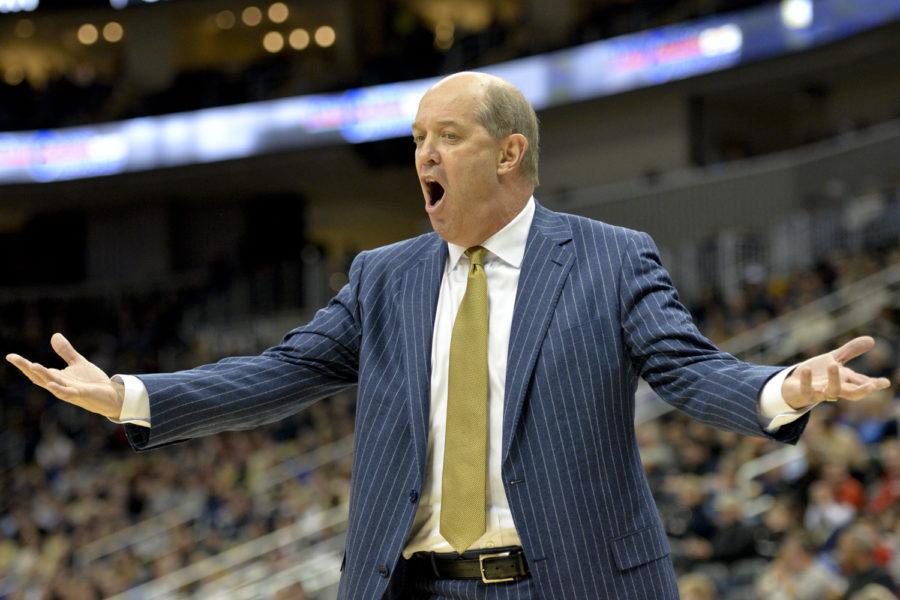The Pitt men’s basketball team, under head coach Kevin Stallings, is currently 8-12 overall, with an 0-7 record in the ACC. That puts the Panthers in the basement of the conference. To make matters worse, they’ve struggled to keep games close — all seven ACC losses have been decided by 14 points or more.
So, with one of the worst seasons in Pitt basketball history underway, the popular question becomes: who is to blame?
For most Pitt fans, the answer is simple — Stallings. The default scapegoat for any struggling sports team, at any level, is the head coach. In Stallings’ case, the program’s instantaneous downturn after the departure of longtime head coach Jamie Dixon — who guided the Panthers to an NCAA tournament appearance in 11 of his 13 seasons — looks particularly bad.
[Read the counterpoint: Stallings should go]
To provide some background, the Panthers went 16-17 overall and 4-14 in the ACC last year in Stallings’ inaugural season as head coach. In the off-season, Pitt lost four seniors to graduation, as well as five players who decided to transfer. That left Stallings with just two experienced returning players — seniors Ryan Luther and Jonathan Milligan — entering this season.
And now, with one-and-a-half poor seasons to show in his time at Pitt, people are calling for Stallings to lose his job — which is absolutely ridiculous.
What more do fans expect from someone whom they’ve given such little support? Stallings was met with lukewarm reception from the moment his name was announced as head coach — as though we were expecting Coach K to leave Duke and come coach the Panthers. Apparently, Stallings didn’t come from an alluring enough program, or his resumé wasn’t impressive enough for Pitt fans.
Stallings built up a solid reputation during his 17-season stint at Vanderbilt. He left as the Commodores winningest head coach, having guided eight seasons of more than 20 wins and accumulated a 471-300 all-time record between his time at Vanderbilt and Illinois State. He’s been to nine NCAA tournaments and has coached 10 NBA players. Pitt fans like to question his decisions as though he’s a rookie, but he’s been at this for a long time.
Stallings’ critics blame him for the erosion of the coach-team relationship that led to last off-season’s mass exodus of underclassmen transfers. But the fact is, turnover happens. Players like to play for the coach who recruited them, which, for many of those players, was Dixon.
Now, coaching a team mostly composed of first years and junior college transfers, Stallings is routinely booed at home games when his name is announced. While this seems like an outward sign of negativity towards Stallings, in reality, it represents the real, underlying feeling of most Pitt fans: bitterness over Dixon’s departure.
Pitt fans became spoiled during Dixon’s tenure. They forgot what it was like to face adversity in the regular season. They took NCAA tournament appearances for granted. Now, in his absence, they’re taking their frustration out on Stallings because he hasn’t been able to immediately live up to the example set by his predecessor.
I would encourage Pitt fans to take a step back from the “fire Stallings” mentality, at least for now. One year does not represent a trend. Even two years does not represent a trend. For as experienced of a coach as Stallings is, he ought to be afforded a rebuilding period, some time to implement his own system using his own recruits.
The Panthers may not win another game all season. But Pitt fans should take solace in the fact that the team can only get better from here. With a core group of first-year players — such as Marcus Carr, Shamiel Stevenson, Parker Stewart and Khameron Davis — earning at least 22 minutes per game in the nation’s premiere basketball conference, it’s only a matter of time before the program begins to trend upward once again.
And if players continue to exit the program each off-season and Stallings’ teams continue to lose games for the next couple years, Pitt fans have every right to demand a change in coaching. But for now, Pitt fans need to give Stallings time to rebuild the program and move forward.


